Looking back towards Las Grutas.
Variable Hawk, being mobbed by
Chalk-browed Mockingbird.
Female
Chalk-browed Mockingbird
For our walking day today, 7th June we decided to walk north from our apartment, into an area of Patagonian scrub (that we know so well) & then came back down the beach at high tide. We were away about five hours & we enjoyed sunshine throughout the walk! We were very lucky to have such a nice day, weather wise.
Harris's Hawk
Juvenile
Uncommon here.
Best birds:
1 juvenile Harris's Hawk; 2 Variable Hawk; 22 Burrowing Parakeet; 1 Scale-throated Earthcreeper; 2 White-throated Cacholate; 2 Tufted Tit-Tyrant; 3 Greater-Wagtail Tyrant; 22 Greyish Baywing; 3 Common Diuca Finch; 55 Mourning Sierra Finch.
There are some nice
dune habitat here.
Birds were a little
scarce though.
We were lucky in that our walk coincided with high tide, so we had good numbers of birds loafing on the beach.
Neo-tropic Cormorant & Kelp Gulls.
Neo-tropic Cormorant
American Oystercatcher
Best birds:
1 Black-necked Swan; 74 Crested Duck; 15 White-tufted Grebe; 13 Great Grebe; 14 Silvery Grebe; 138 American Oystercatcher; 563 Two-banded Plover; 7 Greater Yellowlegs; 2 Magellanic Penguin; 23 Manx Shearwater; 750 Sooty Shearwater; 46 Neo-tropic Cormorant.
It was an excellent day out one which we both enjoyed, thanks mainly to the excellent weather we experienced.
We left the apartment around 9 am on 8th June & headed towards the small airport on the edge of town. We then walked inland towards a low ridge & returned by a slightly different line through the scrub. It was a cold, dull overcast morning & activity was not particularly high.
Cordilleran Canastero
This is a highly localised & rare species
this far away from the mountains.
This bird was found on a ridge
above the scrub-lands.
A new bird for Delana.
We left the apartment around 9 am on 8th June & headed towards the small airport on the edge of town. We then walked inland towards a low ridge & returned by a slightly different line through the scrub. It was a cold, dull overcast morning & activity was not particularly high.
Burrowing Parakeet
On our way home we came across these Burrowing Parakeets & at last the sun started to shine!
While sea-watching from the garden on 10th June I saw the Gannet sp. fly north! So with a quick look at Google Earth, we found a track that would get us into the bay at San Antonio Oeste. So we quickly drove around to see if we could get closer to the Gannet. We didn't see it again, which was a shame as we need better photographs of it.
Best birds:
On the 1st July we went for a walk south of Las Grutas towards Piedras Coloradas (but not getting quite that far). It was a cold dull afternoon but the birding was quite good.
Although only a few kilometres away from
Las Grutas, the wide sandy beaches are a new
habitat for us to bird watch.
Grey Plover
This species is a rarity in Rio Negro.
Twelve birds were present.
These would be first summer plumage birds
& probably will not migrate all the way north
& won't be on their breeding grounds until
next year.
There is extensive dune habitat behind the beach,
but it holds very few species.
The beach is backed by extensive dune systems.
Few bird were around in the high wind.
Lesser Shrike-Tyrant
It was nice to get good views of this species.
blighted the landscape.
On the morning of 11th June we decided to work a bit of scrub land around the huge rubbish tip, just outside of the town. However, the walk was a disappointment as the wind was very strong & we saw little.
This area has extensive sand & mudflats & in season
is home to thousands of wading birds.
It is of course out of season now!
12th June we went back to San Antonio Oeste. It was a bit of a gamble as high winds were forecast & unfortunately they arrived before high tide could push the waders closer to us. However, we did see 3 Grey Plover. Spent the rest of the time birding the dune habitat. Very few birds but did manage to see both Lesser & Grey-bellied Shrike Tyrants. Also a Dark-faced Ground-Tyrant nearby. Birding was challenging in the conditions & we came back to the apartment early.
This is a very pleasant walk amid nice scenery.
15th June we went south along the coastal dirt track & then walked along the beach & explored a bit of the scrub habitat among the small sandstone cliffs.
but the second time we have seen it
at this location.
sandstone cliffs & feeding on the foreshore.
We observed 1,130 Two-banded Plover
in this habitat.
coast here in winter.
Best birds:
1 Elegant-crested Tinamou; 1,110 Two-banded Plover; 1 Rufous-chested Dotterel; 1 White-rumped Sandpiper; 1 Royal Tern; 1 Black-browed Albatross; 1 Southern Giant Petrel; 24 Sooty Shearwater; 2 Magellanic Cormorant; 2 Cocoi Heron; 13 Black-faced Ibis; 2 Peregrine; 1 Chaco Earthcreeper; 2 Scale-throated Earthcreeper; 2 Short-billed Canastero; 12 Dark-faced Ground Tyrant.
The Gannet species was again seen well offshore fishing in the bay. it seems to be covering a huge area & sticking around. We were very pleased to see the Rufous-chested Dotterel.
An excellent full day out & a great walk along the coast.
We enjoyed fine but cold weather, but the most
important thing was the lack of wind.
on the main road into Las Grutas!
on the edge of town.
We stayed home on the 16th June but went birding in town in the afternoon. Found a scrubby area with some large trees in town & then birded the edge of the Golf Course. It was a surprisingly productive session.
Best birds:
34 Spot-winged Pigeon; 8 Picui Ground Dove; 2 Chaco Earthcreeper; 1 White-tipped Plantcutter; 2 Cattle Tyrant; 1 Blue & White Swallow; 5 Hooded Siskin; 24 Greyish Baywing; 3 Blue & Yellow Tanager.
South American Grey Fox
We have seen several before,
but only glimpses.
A favorite food for the Fox!
We drove into town to get a puncture fixed, but it turned out to be a lovely outing around the edge of Las Grutas, in an area which was new for us.
This is what the habitat looked like.
so far away from the Andes
where its stronghold is.
On 18th June we drove south of town to Piedras Colorades a small settlement on the dirt coastal road. It was an overcast & cold morning but we persevered & the birding although very limited, was good. We concentrated on the Patagonian scrub & din't bird the nearby coast.
Burrowing Owl
This bird was our first record.
around Las Grutas.
3 Elegant-crested Tinamou; 2 Burrowing Owl; 4 Short-billed Canastero; 1 Sharp-billed Canastero; 1 Patagonian Canastero; 1 Stripe-crowned Spinetail; 1 Brown Cacholate; 1 White-throated Cacholate; 1 White-tipped Plantcutter; 4 Tufted Tit-Tyrant; 2 Greater Wagtail-Tyrant; 1 Chiguanco Thrush; 2 Hooded Siskin; 110 Mourning Sierra Finch.
Only 22 species were seen, but the quality was quite good. Chiguanco Thrush being especially noteworthy.
On 20th June we went for a walk around town & found a Limpkin! Didn't manage to get any photos of it as it dived into a thicket immediately. Have to go back in the morning.
Best birds:
Limpkin; Variable Hawk; Checkered Woodpecker; Short-billed Canastero; 2 White-throated Cacholate; White-tipped Plantcutter; Hooded Siskin; 3 Blue & Yellow Tanager; 10 Mourning Sierra Finch.
The habitat where the Limpkin was found.
for this region.
Today 21st June we were out early looking to photograph the Limpkin after realizing that it is a new species for the province of Rio Negro! We birded the spot, but no joy, then Delana played the tape & up it popped! We were very relieved to get such good views & photos of this rare bird for here.
Burrowing Parakeet
After our success we once more birded the camping grounds looking for Checkered Woodpecker. Despite the conditions being ideal, we drew a blank, but we did enjoy a few nice species.
Best birds:
Limpkin; Campo Flicker; Scale-throated Earthcreeper; 2 White-throated Cacholate; 3 Plain-mantled Tit-Spinetail; 4 Tufted Tit-Tyrant; Greater Wagtail Tyrant; Stripe-crowned Spinetail; 2 Hooded Siskin; 10 Blue & Yellow Tanager; 2 Common Diuca Finch; 7 Mourning Sierra Finch.
Scenic, but no birds!
On 25th June we managed to get travel papers & visit the area around San Antonio Este. This is a very small town & despite being just across the bay is a quite a long drive to get there. We had lovely sunny weather although it was very cold! We first visited the reserve of Playa Puerto San Antonio which is world famous for shorebirds, but of course they are far to the north these days. The area is quite scenic but it was pretty bird-less while we were there.
This is a well known South American Sea Lion
haul out spot.
This beach is made up of shells!
Magellanic Penguin.
On our way back we made a short detour down the remote Bahia Creek Road. Bahia Creek itself is 83 kms from the junction. We just did a drive to see the area & stopped for a short sea-watching at Playa Vinassa. Would like to go back & explore the area further.
Best birds:
10 Black-browed Albatross; 3 Southern Giant Petrel; 190 Sooty Shearwater; 3 Black-crowned Night-Heron.
We enjoyed getting out & walking around the area but in truth not a great deal seen.
Limpkin is still here!
On 26th June we had an afternoon walk in Las Grutas just south of where we live, accessing coastal dune vegetation & birding the nearby campsites. It was a cold, overcast day but the birding was quite good.
White-throated Cacholote
White Monjita
Best birds:
Limpkin; 2 Burrowing Owl; White-throated Cacholote; Scale-throated Earthcreeper; White Monjita.
Looking north east into the bay.
The 27th June was a cold, overcast day. Spent the morning video conferencing with my daughters. Delana was working on her fish book & it took a lot of persuasion from me to get her to go out. Eventually we did & it was still cold & grey. We walked through the Patagonian scrub habitat seeing a few of the normal species, but nothing very special.
Magellanic Plover
Strangely they were not together.
We decided to return via the beach, as the tide was coming in & thought we might get good counts of waders. As we hit the beach the sun started to shine & it suddenly became a pleasant walk. A large roosting flock of Two-banded Plover were on the beach & as I scanned them through the scope i saw a small bird with brightly coloured legs. Our first Magellanic Plover! I didn't realise that they were so small. Careful scrutiny revealed four individuals. I got closer to try & get some photos.
Sanderling & Two-banded Plovers
American Oystercatcher
The 28th June was a very cold & wet day. I ventured out mid-afternoon but the walk wasn't pleasant. It really wasn't properly daylight. I walked north along the beach seeing very little in the pouring rain. However the tide was coming in, pushing the waders towards me. On any other day could have got some nice photos, but far too dark today. Got to the spot of yesterdays triumph & spotted 6 Magellanic Plovers! They were again associating with the Two-banded Plovers, which numbered an incredible 850 today. Walked quickly back to the apartment, I was frozen!
Leaving Las Grutas after 113 nights!
Looking south.
29th June was another very cold & overcast day with rain in the morning. Mid afternoon it stopped raining so we went for a walk through town. Reached the last houses going south & birded the gully there. It was surprisingly productive. Best being two male & a female Chiguanco Thrush in the gully.
Limpkin
30th June, the last day of the month. Time is flying by. I went for a walk south along the dunes to check if the Limpkin was still present & it was! A pair of Scale-throated Earthcreeper showed well.
What a brilliant little bird!
Late afternoon we walked north up the beach, checking the waders for you know what! And we found them: 3 Magellanic Plovers.
Imperial Cormorant
Best birds:
Snowy Sheathbill; 4 Magellanic Penguin; Southern Giant Petrel; 46 Imperial Cormorant; 5 Black-crowned Night-Heron; 3 American Black Vulture; Cinereous Harrier; 2 Burrowing Owl.
parallel to the beach.
happening on the beach as well.
2nd July dawned bright & sunny with only a little wind. So we went for a walk starting from the southern edge of Las Grutas, birding through the dunes to Piedras Coloradas & we returned along the beach.
Plain-mantled Tit-Spinetail
Tufted Tit-Tyrant
South American Sea Lion
Kelp Gulls & a single Royal Tern
on these small islets.
Best birds:
3 Black-necked Swan; 40 Crested Duck; 65 Chilean Flamingo; Chilean Skua; Southern Giant Petrel; Giant Petrel sp.; 106 Imperial Cormorant; 4 Scale-throated Earthcreeper; 4 Plain-mantled Tit-Spinetail; 6 Tufted Tit-Tyrant; 4 Dark-faced Ground Tyrant; 6 Silvestrin Siskin;
It was a great day out walking the lovely coastline & enjoying some good birds with great weather.





















































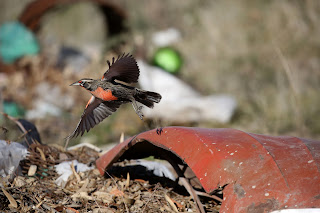














































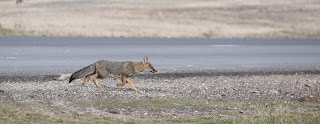



















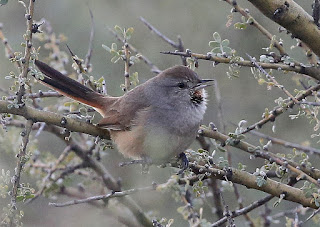










































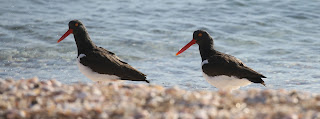










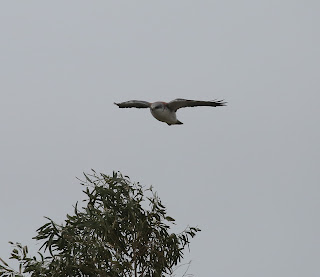

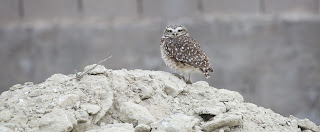
















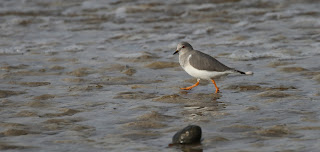



















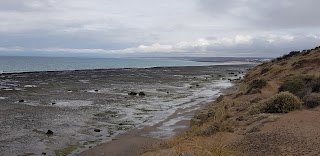













































No comments:
Post a Comment